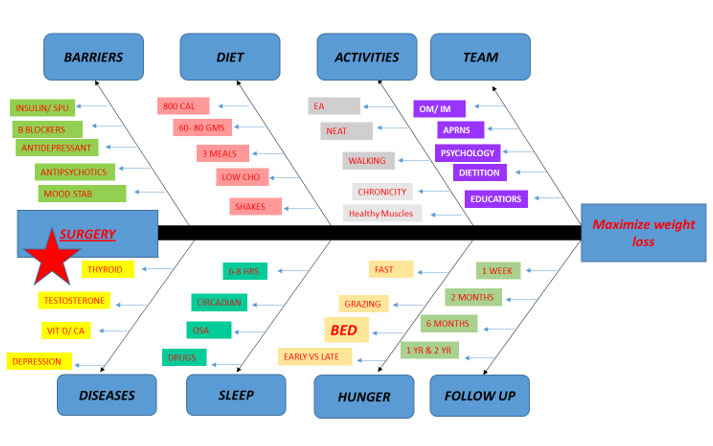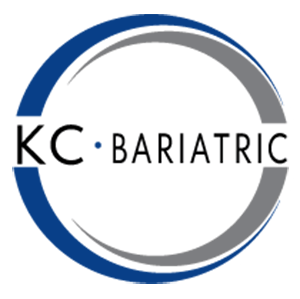The fishbone diagram below shows different things that affect our weight after surgery and addresses what we need to do with each area in order to maximize weight loss in the first 6 – 9 months following surgery.
The first 3 things to address when someone stops losing weight are to:
- Stop protein shakes – need to be eating protein using whole foods
- Make sure you are getting enough Calcium Citrate – it is essential for losing weight
- Make sure you are eating at least 800 calories a day, because your metabolism will slow if you eat less than that each day.
The other areas discussed were:
- Barriers to weight loss – these need to be removed. 10% of excess weight can be attributed to medications that cause us to gain weight or prevent weight loss. These include:
- Insulin and sulfonylureas for type 2 diabetes
- Beta blockers
- Antidepressants
- Antipsychotics
- Mood stabilizers
- We need to treat disease states that contribute to weight gain, such as:
- Hypothyroidism – and we need to recheck the thyroid after every 30 – 40 lb weight loss after surgery and readjust thyroid medication
- Testosterone deficiency in men
- Vitamin D3 and Calcium levels need to be optimized; a deficiency in calcium can negatively impact weight loss
- We need to address depression
- Bariatric surgery is the best option for resolving type 2 diabetes, obstructive sleep apnea, hypertension, and high cholesterol
- Dietary concerns include:
- Eating 800 calories a day
- Getting 60 – 80 grams of protein a day
- Getting around 50 gm of carbohydrates a day
- Eating 3 meals a day – don’t wait until you get hungry!
- Use protein shakes only for the short term. Try to be off protein shakes within a couple of months, and then just use them occasionally! The number one reason people stop losing weight and plateau once they are more than 2 – 3 months out is they continue to have a daily protein shake, when they need to be eating their protein instead.
- Eat real food – not processed food
- Sleep is very important:
- We need 6 – 8 hours of good quality sleep
- We all have a certain circadian rhythm when hormones have peaks and valleys, and these can affect how our body rests, our metabolism, and how we deal with stress. If you don’t get enough good quality sleep, it causes your stress hormones to rise and increase weight.
- Sleep apnea can significantly affect the quality of sleep – wearing your CPAP can improve weight loss
- Certain sleep aid medications can cause you to gain weight, such as Benadryl
- Activity should be used to keep muscles healthy. The healthier your muscles, the faster your metabolism, so think of activity as keeping your muscles healthy instead of exercising to lose weight. 150 minutes of activity a week will help maintain weight loss, but to optimize weight loss you need to increase to 300 minutes a week or increase the intensity of your activity, such as resistance or weight training.
- Hunger is something most patients don’t deal with after surgery. However, 30 – 40 % of patients have Binge Eating Disorder, and after surgery can show up as Loss of Control Eating.
- Do not fast – when you fast, your metabolism slows down in order to conserve energy, and your body is very efficient at storing energy.
- Grazing and night time eating out of boredom can prevent weight loss – you need to find another activity to satisfy you at those times
- Frequently hunger is really dehydration – try drinking when you feel hunger, especially in the early months.
- There is no way you can be physically hungry after surgery, but you may feel mental hunger. That needs to be addressed
- It takes an entire team to provide resources to assist patients for weight loss success. In addition to the surgeons our team includes:
- Internal Medicine/Obesity Medicine Physician
- Nurse Practitioners
- Clinical Psychologists
- Dietitians
- Educators
- Follow up after surgery is critical, as the earlier we are able to intervene when someone isn’t losing weight as expecting, the sooner we can help them get back on track to reach their goal. We need to see patients at 1 week post op, 2 months, 6 months and then annually. Our goal is that our patients reach their maximum weight loss within 18 months, regardless of which procedure they have done.


